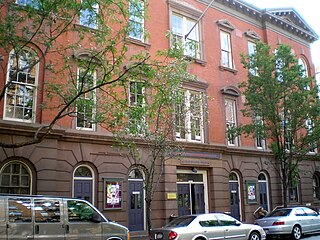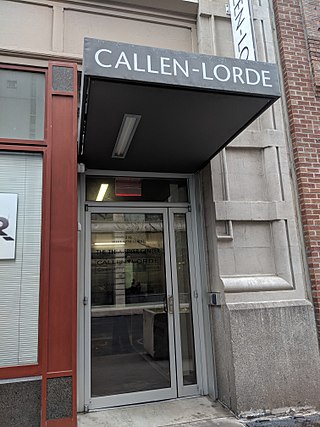
A gay village, also known as a gayborhood, is a geographical area with generally recognized boundaries that is inhabited or frequented by many lesbian, gay, bisexual, transgender, and queer (LGBTQ) people. Gay villages often contain a number of gay-oriented establishments, such as gay bars and pubs, nightclubs, bathhouses, restaurants, boutiques, and bookstores.

The AIDS epidemic, caused by HIV, found its way to the United States between the 1970s and 1980s, but was first noticed after doctors discovered clusters of Kaposi's sarcoma and pneumocystis pneumonia in homosexual men in Los Angeles, New York City, and San Francisco in 1981. Treatment of HIV/AIDS is primarily via the use of multiple antiretroviral drugs, and education programs to help people avoid infection.

Lakeview, also spelled Lake View, is one of the 77 community areas of Chicago, Illinois. Lakeview is located in the city's North Side. It is bordered by West Diversey Parkway on the south, West Irving Park Road on the north, North Ravenswood Avenue on the west, and the shore of Lake Michigan on the east. The Uptown community area is to Lakeview's north, Lincoln Square to its northwest, North Center to its west, and Lincoln Park to its south. The 2020 population of Lakeview was 103,050 residents, making it the second-largest Chicago community area by population.

Center on Halsted is a lesbian, gay, bisexual, and transgender (LGBTQ) community center in Chicago, Illinois.

The Lesbian, Gay, Bisexual & Transgender Community Center, commonly called The Center, is a nonprofit organization serving the lesbian, gay, bisexual and transgender (LGBTQ) population of New York City and nearby communities.
Lorrainne Sade Baskerville is an American social worker, activist, and trans woman best known for founding transgender advocacy group transGENESIS.

Callen-Lorde Community Health Center is a primary care center located at 356 West 18th Street in New York, New York, with satellite locations in Brooklyn and The Bronx. Callen-Lorde also provides comprehensive mental health services at The Thea Spyer Center, located at 230 West 17th Street. Callen-Lorde is dedicated to providing medical health care to the city's LGBTQ population without regard to ability to pay. It is named in honor of Michael Callen and Audre Lorde.
AIDS Foundation of Chicago is a locally based, non-profit organization that advocates for HIV/AIDS prevention as well as serves as a general resource for the HIV/AIDS community. Founded in 1985, some of their better-known accomplishments include hosting fundraisers to support the distribution of HIV/AIDS related medications in the city, funding the Open Door Health Center, and launching their “Getting to Zero” plan. Their cause seeks to increase the amount of resources available to the HIV/AIDS community as resources are too few and far between. Similar to other city organizations focused on sexual health such as Howard Brown Health, AFC makes getting access to treatment easier for all patients, decreases the stigma around treatment, and promotes the awareness and acceptance of those who live with HIV and/or AIDS.

Many retirement issues for lesbian, gay, bisexual, transgender (LGBTQ) and intersex people are unique from their non-LGBTI counterparts and these populations often have to take extra steps addressing their employment, health, legal and housing concerns to ensure their needs are met. Throughout the United States, "2 million people age 50 and older identify as LGBT, and that number is expected to double by 2030", estimated in a study done by the Institute for Multigenerational Health at the University of Washington. In 1969, the Stonewall Riots marked the start of the modern gay rights movement and increasingly LGBTQ+ people have become more visible and accepted into mainstream cultures. LGBTQ+ elders and retirees are still considered a newer phenomenon creating challenges and opportunities as a range of aging issues are becoming more understood as those who live open lives redefine commonly held beliefs and as retirees newly come out of the closet.

Whitman-Walker Health (WWH), formerly Whitman-Walker Clinic, is a non-profit community health center in the Washington, D.C. metropolitan area with a special expertise in HIV/AIDS healthcare and LGBT healthcare. Chartered as an affirming health center for the gay and lesbian community in 1978, Whitman-Walker was one of the first responders to the HIV/AIDS epidemic in D.C. and became a leader in HIV/AIDS education, prevention, diagnosis and treatment. In recent years, Whitman-Walker has expanded its services to include primary healthcare services, a stronger focus on queer women's care and youth services.
Various issues in medicine relate to lesbian, gay, bisexual, and transgender people. According to the US Gay and Lesbian Medical Association (GLMA), besides HIV/AIDS, issues related to LGBT health include breast and cervical cancer, hepatitis, mental health, substance use disorders, alcohol use, tobacco use, depression, access to care for transgender persons, issues surrounding marriage and family recognition, conversion therapy, refusal clause legislation, and laws that are intended to "immunize health care professionals from liability for discriminating against persons of whom they disapprove."
The LGBTQ community in Chicago is one of the United States' most prominent, especially within the Midwest, alongside those of San Francisco and New York City, and holds a significant role in the progression of gay rights in the country. With a population of around 3 million, Chicago is the third biggest city in the US, and around 150,000 of those people identify as lesbian, bisexual, gay, transgender, questioning, or other.

Ruby Corado is an activist who founded Casa Ruby, a bilingual, multicultural LGBT organization in Washington, D.C. Established in 2012, Casa Ruby identifies its mission as "to create success life stories among Transgender, Genderqueer, and Gender Non-conforming Gay, Lesbian and Bisexual people." In July 2022, Corado was accused of mismanagement of Casa Ruby, which forced the organization to cease operations.

The African-American LGBT community, otherwise referred to as the Black American LGBT community, is part of the overall LGBTQ culture and overall African-American culture. The initialism LGBT stands for lesbian, gay, bisexual, and transgender.
Chicago Foundation for Women (CFW) is a nonprofit grantmaking organization that focuses on creating opportunities and resources for women in the Chicago area. Many Chicago based organizations such as South Side Giving Circle and LBTQ Giving Council further help women that face violence, poverty, and discrimination using the resources from CFW. CFW receives donations from individuals and corporations, grants from other organizations, the MacArthur Foundation, and partners, The Eleanor Neal foundation, to invest in organizations providing services to Chicago area women in need.

The health access and health vulnerabilities experienced by the lesbian, gay, bisexual, transgender, queer or questioning, intersex, asexual (LGBTQIA) community in South Korea are influenced by the state's continuous failure to pass anti-discrimination laws that prohibit discrimination based on sexual orientation and gender identity. The construction and reinforcement of the South Korean national subject, "kungmin," and the basis of Confucianism and Christian churches perpetuates heteronormativity, homophobia, discrimination, and harassment towards the LGBTQI community. The minority stress model can be used to explain the consequences of daily social stressors, like prejudice and discrimination, that sexual minorities face that result in a hostile social environment. Exposure to a hostile environment can lead to health disparities within the LGBTQI community, like higher rates of depression, suicide, suicide ideation, and health risk behavior. Korean public opinion and acceptance of the LGBTQI community have improved over the past two decades, but change has been slow, considering the increased opposition from Christian activist groups. In South Korea, obstacles to LGBTQI healthcare are characterized by discrimination, a lack of medical professionals and medical facilities trained to care for LGBTQI individuals, a lack of legal protection and regulation from governmental entities, and the lack of medical care coverage to provide for the health care needs of LGBTQI individuals. The presence of Korean LGBTQI organizations is a response to the lack of access to healthcare and human rights protection in South Korea. It is also important to note that research that focuses on Korean LGBTQI health access and vulnerabilities is limited in quantity and quality as pushback from the public and government continues.
Janet Inez Weinberg was an American LGBTQ activist, advocate for people with HIV/AIDS and advocate for disability rights, based in New York City. She was a fund-raiser and executive for social service organizations including Gay Men's Health Crisis (GMHC), Educational Alliance, and the Lesbian, Gay, Bisexual and Transgender Community Services Center.

The ongoing COVID-19 pandemic has highlighted inequities experienced by marginalized populations, and has had a significant impact on the LGBT community. Pride events were cancelled or postponed worldwide. More than 220 gay pride celebrations around the world were canceled or postponed in 2020, and in response a Global Pride event was hosted online. LGBTQ+ people also tend to be more likely to have pre-existing health conditions, such as asthma, HIV/AIDS, cancer, or obesity, that would worsen their chances of survival if they became infected with COVID-19. They are also more likely to smoke.

David Douglas Kelley was a Canadian LGBTQ rights activist and organizer, AIDS educator, and youth worker.
Peter Goldblum is an American psychologist who is Professor Emeritus and Founding Director of the LGBTQ+ Area of Emphasis at Palo Alto University (PAU). He founded one of PAU's Gronowski Center's specialty clinics, the Sexual and Gender Identities Clinic (SGIC), and one of PAU's research labs, the Center for LGBTQ Evidence-based Applied Research (CLEAR). In the past 50 years, he has engaged in the development of community-based mental health programs and policies for the LGBTQ+ population in the San Francisco Bay Area.













